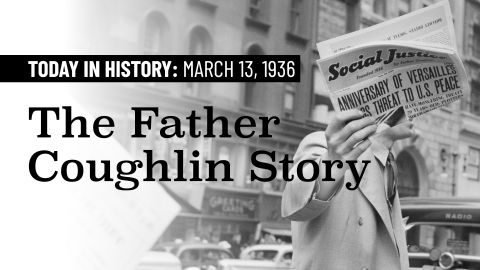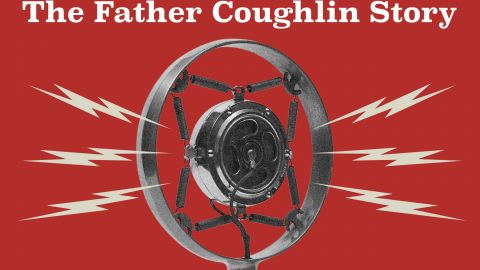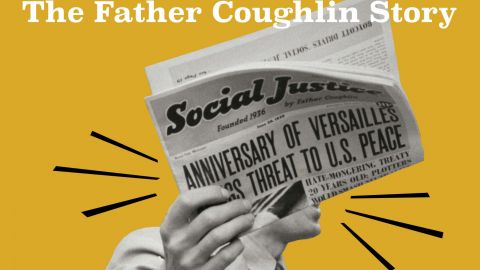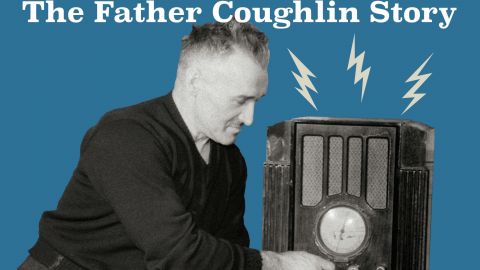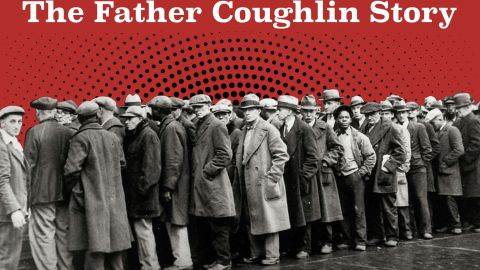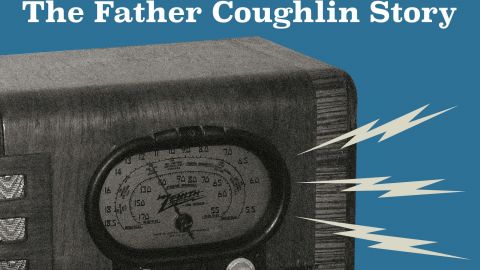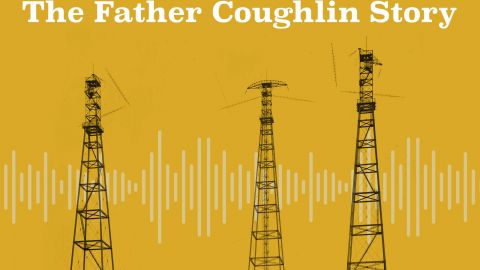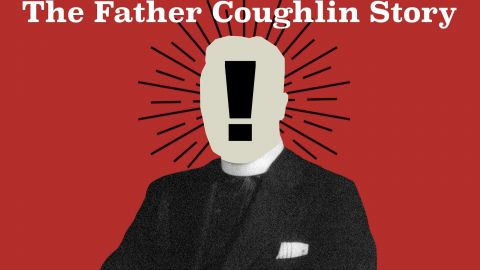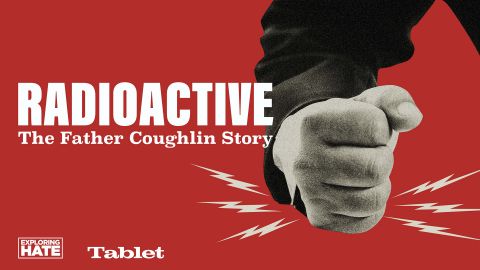The following is a production of Tablet Studios in association with The WNET Group’s reporting initiative, Exploring Hate: Antisemitism, Racism and Extremism, and with support from Maimonides Fund.
Radio announcer: Ladies and gentlemen, this afternoon, Father Coughlin will discuss one of the most vital and burning questions of our day. The question of the Jew and of the Christian and of persecution.
Andrew Lapin: On July 31st, 1939, a group of young men gathered in a dance hall called Ebling’s Casino in the Bronx. In the hallway were big signs reading “Buy Christian” and “Are the refugees to get American jobs?” The men in attendance wore blue armbands with the initials C.M. Christian Mobilizers. A series of speakers made their way to the podium, each one spouting more extreme rhetoric than the last. Photographers from Life magazine were there furiously clicking their shutters, even as the speakers denounced the press as lousy. The enthusiastic crowd gave shouts and cheers whenever a speaker insulted Jews, slammed President Roosevelt or quoted Adolf Hitler. A few of them raised their arms in a Nazi salute. A man named Edwin Westphal, one of the leaders of the Christian mobilizers, took the stage to denounce international Jewry and Jewish bankers. Westphal said that many young people had recently taken up their group’s cause. He prophesied, quote, “the march of these young men across America, supplanting the Democratic and Republican parties, which are based on tolerance, democracy and so-called peace.” Like other speakers that day, Westphal also took time to praise the man he believed to be the father of this nascent movement, the man whose fiery rhetoric inspired both the style and substance of the Christian Mobilizers: Father Charles Coughlin. For the past several months, Coughlin had been using his radio show to encourage grassroots organizations of right wing radicals to rise and take back America from the Communists. It was time, he bellowed, to make America a Christian nation again. Just that week, Coughlin had used his radio show to rally the biggest of these groups, the Christian Front.
Charles Coughlin: No observant person questions the need of a Christian Front in America. A Christian Front for Jew and Gentile — lest there be imposed upon all of us a popular Marxian Front. No informed person denies that the day for tolerance towards the Communist front has passed.
Andrew Lapin: Westphal had started out as one of the 100,000 Christian Fronters nationwide. He eventually left to launch the Mobilizers, his own more violent attempt to purge America of communists and Jews. But the Christian Mobilizers also took their marching orders from Coughlin. They sold his magazine, Social Justice, at their meetings and listened to his radio show religiously. During his speech, Westphal declared it was the mission of the mobilizers to go out and sell copies of Social Justice for Father Coughlin, to spread the word of what they intended to do with America. The leader of the Mobilizers, Joe McWilliams, spoke next. He had brought a young Christian girl whom he claimed had her nose smashed in by a Jewish thug. Addressing the crowd, he screamed, “Are we going to let that happen to our women?” As the Mobilizers strategized future street attacks against the Jews, McWilliams also told his followers not to worry about the police. Most of them secretly stood with the Mobilizers, he said, and would be with them when the time came. Finally, wrote one person who attended the meeting, McWilliams promised that attacks launched against Christian free speech were to be tolerated no longer. Reaching a peak of oratory, he foretold that under the greatest mind in America, Father Coughlin, the restoration of America to the militant national Christian would soon be at hand. From city to city, state to state, the Christian Mobilizers marched to victory.
Charles Coughlin: Form your ranks in the Church Militant.
Andrew Lapin: Coughlin’s hate was no longer confined to the airwaves. The room swelled and cheered, and the mobilized young men grabbed whatever weapons they had brought with them, along with their copies of Father Coughlin’s magazine, and stormed the streets of New York. I’m Andrew Lapin and this is Radioactive, an eight part series from Tablet Studios and Exploring Hate about Father Charles Coughlin, the famous radio priest, notorious antisemite, and a man who changed American culture and politics forever. Episode seven: Sedition.
Charles Coughlin: This is the Fischer Building, Detroit, from whose tower, the home of radio station WJR, have emanated many of the broadcasts of the Rev. Charles E. Coughlin, the voice of thought and sympathy from the heart of Michigan’s greatest city.
Andrew Lapin: Two years before that meeting in Ebling’s Casino, Father Coughlin had hit a wall. His Social Justice Party had suffered a humiliating defeat in the 36th election. The loss was so brutal that he shut down the party entirely. Also, he was now under investigation. All that talk of rising up against the government got the government paying attention. A brand new agency called the Federal Bureau of Investigation, headed by a hard charging official named J. Edgar Hoover, had started a file on Coughlin. They were concerned that he would fulfill his campaign promise to mount a violent march on Washington. Worst of all for the priest was the death in January of Bishop Michael Gallagher, Father Coughlin’s friend, superior and protector. He was replaced by Archbishop Ed Mooney, a man selected by the Vatican, it seemed, for the sole purpose of muzzling the popular radio priest. Mooney tried to reason with Coughlin at first, but soon he was laying down the law. In a long series of letters between the two, Mooney demanded that every radio script and every Social Justice article be submitted to his office for advance approval. Coughlin wasn’t about to suffer anyone who stood between him and the glory he felt he so richly deserved. He lied to Mooney, telling the archbishop that he himself had no control over the magazine’s content, even though his name was displayed prominently in every issue. While feigning ignorance to his boss, he used the pages of social justice to reprint the protocols of the Elders of Zion. Just like his idol, Henry Ford, Coughlin employed his newspaper to disseminate the notorious anti-Semitic hoax. But the protocols were, by this point, decades old. It was time for something edgier and more contemporary. On December 5th, 1938, Social Justice printed a piece titled “Background of Persecution,” a point-by-point litany of the horrors inflicted on the European people by Jewish Communists and Socialists. The byline on the piece was Coughlin’s. Its actual author? Hitler’s propaganda minister Joseph Goebbels.
Andrew Lapin: Goebbels had delivered the same text as a speech in German, months earlier, now plagiarized nearly word for word by Father Coughlin himself. Goebbels was only the beginning. Europe had no shortage of monsters Father Coughlin was eager to embrace, including the one who governed Italy.
Andrew Lapin: “Date: September 6th, 1938. To the honorable Benito Mussolini, may it please your excellency. So much misunderstanding has been created by the unfriendly press in America relative to your statements that I am inclined to invite Your Excellency to write an article for our national magazine in which you can clarify your attitude toward the Jews, toward the national question and toward any other point that you wish to make clear for the American leaders. Social Justice magazine has a million readers and will be happy not only to publicize your article, but to support it editorially. Wishing Your Excellency God’s blessings and good health, and praying that the Italian Empire under your leadership will crush Communism, may I remain humbly yours, Charles E. Coughlin.” According to the FBI file being maintained on Coughlin, since 1933, the priest had been writing admiring letters, including this one to Mussolini, sometimes sending him packages, booklets and other gifts. Coughlin loved Mussolini’s embrace of Fascism.
Benito Mussolini: My fellow citizens who are working to make America great…
Andrew Lapin: He was also a fan of Francisco Franco in Spain because he believed the two of them had rescued the Catholic faith from the violent attempts in Communist-led countries to wipe it off the map. Plus, Mussolini had played a central role in the signing of the treaty which had declared Vatican City an independent state free from government influence. Coughlin was so persistent in trying to make an ally of Il Duce that the Italian ambassador to the U.S. had to advise Mussolini not to have any direct contact with him. The ambassador wrote that Coughlin had become too controversial in America to be a useful ally, calling him, quote “an intelligent type but enamored of the idea of reconstructing the financial world.” Even so, the U.S. government assumed that some of Coughlin’s letters to the dictator were being translated into Italian and used as fascist recruiting tools. Many Italian fascist newspapers were writing admiringly about the priest, calling him a true hero of Christianity. While inspired by Mussolini and Goebbels, Coughlin was feeling the pressure from his superior and was also growing more paranoid because he was being watched by the FBI. Yet at the same time, he now barely concealed his desire to organize a militia that would fight by any means necessary for Christian supremacy in America. Unlike democracy’s pesky checks and balances, this armed group would answer only to him. He called it the Christian Front.
Charles Gallagher: What Coughlin did was he gave his blessing to these men. He, in many ways ideologically wound them up and then let them actively partake in anti-Semitic and anti-communist activities on their own turf while he kept up his national radio career.
Andrew Lapin: Charles Gallagher is a history professor at Boston College and the author of a new book about the Christian Front titled “Nazis at Copley Square.” Again, he’s no relation to Bishop Gallagher.
Charles Gallagher: There was a splinter group which was very tactically designed within that organization to take up arms, to cash weapons, to train militarily, to repel a presumed Communist revolution that was imminent and a takeover of the US government by Bolshevik Soviet Communists.
Andrew Lapin: So how did the Christian Front come to be? In 1937, Coughlin wrote in Social Justice that the Great Depression had been caused by, quote, “the powers of anti-Christianity.” He said that America needed a revival of Christianity to lift itself out of the Depression. By May of 1938, the vague talk of revival had hardened into an action plan. It was time, Coughlin wrote, for a crusade against the anti-Christian forces of the Red Revolution. His most devoted listeners were right wing Irish Catholics concentrated in New York and Boston. Besides being instinctively distrustful of the British, who represented the allied forces in the war, they also believed that the threat of Communism was so great and so imminent that any action they could take against it, no matter how violent, would be purely in self-defense and thus permissible under Christian teachings. These young men were primed and ready to form that crusade on their own. Father Coughlin said that the majority of Americans seemed perfectly fine with allowing communism to grow all over the world. They, Coughlin said, were the so-called Popular Front. To oppose the Popular Front, Christians needed their own army.
Charles Coughlin: For the Christian Front movement was endorsed by many thousands of decent citizens who wear and are a proxy…
Andrew Lapin: Coughlin began openly encouraging the growth of a Christian militia movement on his radio show in 1937. His lead in announcer set the stage:
Radio announcement: He is encouraging the growth of the Christian Front. Not that it is his organization, but that he speaks to its promoters a word of encouragement and a word of advice.
Andrew Lapin: And then Coughlin himself came on:
Charles Coughlin: The Christian Front is no longer a dream. It is a reality in America, a reality that grows stronger, more courageous and under the threat of an ideological invasion.
Andrew Lapin: And so a movement was born. In New York and Boston, members of the Christian front would gather and listen to Coughlin’s radio show. Then they hit the streets, selling copies of Social Justice on street corners. Their sales pitch? It was straightforward: buy the only gentile paper, buy the only paper not controlled by Jews, buy Social Justice before the Jews get hold of City Hall and the U.S. Their tribe is a menace to Christian people. Coughlin’s connection with the Christian front also led to connections with actual Nazis
Charles Gallagher: The headquarters of the Christian Front in Boston was being bought and paid for by a Nazi SS officer who had been sent to Boston in 1938 to turn the screws on a former chancellor of Germany who was living in Boston at the time, Heinrich Brüning and it was decided by Heinrich Himmler and Adolf Hitler that Brüning needed to have the clamps screwed down on him, so they sent a heavyweight SS officer to Boston. Guy by the name of Herbert Schultz. He saw the Christian Front as the kind of ripe picking for his espionage work and successfully recruited Father Coughlin’s regional leader, Francis Moran, who was in Boston. And by the spring and summer of 1940, the leader of the Christian Front in Boston was meeting with this Nazi SS Officer Herbert Schultz and taking direction from him.
Andrew Lapin: The Christian Front held rallies and partnered with pro-Nazi organizations like the German American Bund.
Christian Front rally: I pledge divided allegiance to the flag of the United States of America.
Andrew Lapin: That led to an infamous rally at Madison Square Garden on February 20th, 1939, in which thousands of American fascists packed the arena to hear far-right figures proclaim that America’s true path lay with the Nazis.
Christian Front rally: Ladies and gentlemen, Mr. Fritz Kuhn.
Andrew Lapin: Fritz Kuhn, leader of the German-American Bund, spoke at the rally. Flanked by giant banners of George Washington and a doctored American flag that displayed the swastika in place of the stars signifying the United States, Kuhn even gave a shout out to one man everyone in the crowd respected.
Fritz Kuhn: Ladies and gentlemen, American patriarch, you all have heard of me through the Jewish controlled press as a creature with horns and a cloven hoof and a long tail. But know, my friend, the press, the radio and the cinema are in the hand of the Jews and like Father Coughlin, General Mosley and other outspoken patriarchs, we have the right to the refute these silly charges.
Andrew Lapin: Sometimes a boy trying to sell social justice magazines on a Brooklyn street corner would yell out that the Jewish man nearby had just attacked him. That would sic a whole mob on the Jew. The Front would also get into fights with organized labor groups. One newspaper story from 1939 reported that thousands of Christian Fronters got into an egg and milk bottle melee with the left-wing American Labor Party in the Bronx. While all this was going on, Coughlin was using his radio show to further rile up his listeners against the one group of Americans he most despised. When he first started his show, it wasn’t obvious to most of Father Coughlin’s listeners that he was targeting anyone, in particular. When he would attack the money-grubbing bankers and high ranking Communist Party officials holding the planet hostage, he would make sure to note, in the offhanded way you might reference a weird coincidence, that so many of these people were Jews. If you weren’t paying much attention, you could be forgiven for not hearing the dog whistles. By the late thirties, though, Coughlin clearly felt less and less need for subtlety. He was speaking openly and brazenly about the Jews
Charles Coughlin: The racial supremacy idea entertained by so many reformed liberal Jews to the effect that their nation is the Messiah, that their nation with all its racial proclivities, objectives and determinations must dominate the world.
Andrew Lapin: American Jews were hesitant at first to make an enemy of a powerful persona like Father Coughlin. Dr. Gary Zola is the director of the American Jewish Archives at Hebrew Union College. The archives hold a selection of Jewish responses to Father Coughlin.
Gary Zola: In the early 1930s, there are some sermons from rabbis who note that they’re not entirely thrilled with Father Coughlin, some of the things he says. But one of the points one rabbi makes is it’s a good thing that Father Coughlin is showing that religion has something to say about American society and standing up for the worker and so forth.
Andrew Lapin: The Jewish response to Coughlin first appeared in a fairly polite manner. Rabbi Stephen Wise, a Budapest-born, enormously influential president of the American Jewish Congress, made a radio broadcast on January 6th, 1935.
Stephen Wise: What I should do today is to ask the very reverent and distinguished preist the question whether he deserves to make himself responsible for a terrible and anti-Semitic or anti-Jewish outbreak in America.
Andrew Lapin: Wise was very careful with his words. As he said many times, he was not accusing Father Coughlin of being anti-Semitic.
Stephen Wise: It is a great injustice to accuse Father Coughlin of being anti-Semitic or anti-Jewish.
Andrew Lapin: He was instead pointing out that Coughlin’s continued misstatements of fact about the Jews were regrettably, maybe even unintentionally, contributing to a general atmosphere of anti-Semitism in America. He asked Coughlin to rethink his choice of words, especially when it came to accusing Jewish bankers of starting the Depression. Wise patiently unpacked Coughlin’s declarations that most of America’s outstanding debt was owed to Jewish international bankers. It wasn’t true, Wise said. The biggest international lenders, like JPMorgan, were Christian. Rabbi Wise, likely the most important Jew in America, had appointed himself Coughlin’s unofficial fact checking department. His pleas fell on deaf ears. The radio priest had no interest in curbing his rhetoric about Jews or in sticking only to the verifiable truth. Instead, Coughlin kept spewing anti-Semitic rhetoric while at the same time repeatedly denying that he was in fact, an anti-Semite. He published books with titles like “An Answer to Father Coughlin’s Critics. And “Am I an Anti-Semite?”
Charles Coughlin: I was accused of being un-American, a defender of Nazism, a sadist, and an anti-Semite. Bear in mind that I am accused of saying Stalin and Lenin are Jews, that 13 million Christians were murdered by Communists.
Andrew Lapin: At a certain point, Coughlin’s antisemitism became impossible to deny. On the morning of November 7th, 1938, a Polish Jewish teenager named Herschel Grynzspan bought a gun on the streets of Paris. Grynzspan was a refugee in the city, and his family had just been denied entry at the border, leaving him all alone to fend for himself in a hostile climate. Angry and distraught at the utter hopelessness of the predicament of Europe’s Jews, Grynzspan acted out in a violent rage by shooting and killing a German diplomat named Ernst vom Rath. When news of the assassination reached Germany, the Nazis exploited it for their anti-Semitic propaganda, telling all pureblooded Germans and Austrians that if they didn’t do something soon about the Jewish problem, vom Rath’s fate could be their own. Two nights later, on November 9th, mobs took to the streets of Germany, Austria and Nazi-occupied Czechoslovakia.
Radio announcer: New York Times Thursday, November 10th, 1938, Berlin. In a day of terror surpassing anything even the Third Reich has seen, National Socialist cohorts took vengeance on Jewish shops, offices and synagogues for the murder of a German diplomat by a young Polish Jew. Beginning systematically in the early morning hours in almost every town and city in Germany, wrecking, looting and burning continued all day. Huge but mostly silent crowds looked on as raiding squads of young men roamed unhindered through shopping districts, breaking shop windows with metal weapons, tossing merchandise into the streets and leaving unprotected Jewish shops to the mercy of vandals in an unprecedented show of violence.
Andrew Lapin: The street gangs murdered 91 Jews and Nazi officials rounded up another 30,000 more to ship to concentration camps, all while blaming the Jews themselves for the riots. This horrific mob violence became known as Kristallnacht, the night of broken glass. It was an attack that, for many, signified the moment when Jews could no longer even pretend to have a future in Nazi occupied territory. This was the turning point when rhetoric escalated to brutality. Father Coughlin, though, had a different read on Kristallnacht, and he expressed it on his radio show the following week.
Charles Coughlin: A few days ago, a young Polish Jew fired a shot that was heard round the world. This frenzied youth murdered a German public official in Paris.
Andrew Lapin: Maybe, Coughlin offered, the Jews deserved their persecution, and maybe Jews like Grynzspan were just as culpable for the blood now running through the streets of Europe.
Charles Coughlin: Now to be effectual in our discussion, which is not content merely with offering sympathy for the innocent German Jews, it is necessary to record the following facts.
Andrew Lapin: What were those facts? According to Coughlin, the Jews had incited the Bolshevik Revolution in Russia. The Nazis were simply responding to that Communist threat, so there wouldn’t have been a Kristallnacht if Jewish bankers and officials hadn’t destabilized Europe in the first place.
Charles Coughlin: But as long as misguided Jews and gentiles both and in such great numbers continue to propagate the doctrines of anti-God, anti-Christ, anti-patriotism and anti-property so long there will always exist some defensive mechanism against Communism. Today, it is Nazism in Berlin. Tomorrow it will be some other-ism in New York, but always, it will be characterized by persecution. It is my opinion that Nazism, the effect of Communism, cannot be liquidated in its persecution complex until the religious Jews in high places, in synagogue and finance or radio and press attack the cause. Attack it forthright and the errors and the spread of Communism together with all our co-nationals who support it. The Jew has challenged the Christian for his sympathy and cooperation. In time, the Christian challenges the Jew for his. I will satisfy myself simply by drawing to your attention that since the time of Christ, Jewish persecution only followed, only followed after Christians were first persecuted. Persecuted, even by exploiters within their own ranks as in the Middle Ages, all by the enemies from without as in our own day.
Charles Gallagher: I think we need to talk about the speech from November of 1938 that puts Coughlin on the map as a full blown anti-Semite.
Andrew Lapin: Charles Gallagher again.
Charles Gallagher: This speech becomes a problem for the Vatican because Mooney, now in place as Bishop in Detroit, has corresponded with the Vatican, and he has asked the Vatican to supply him with a statement written by the pope about the pope’s displeasure with Coughlin’s making of that speech. At the same time, the American diplomat on the Vatican staff writes to Bishop Mooney saying and reiterating that the Coughlin situation is better left handled by the local bishop, that you, Mooney, are the person we want to handle this problem that we see happening with Coughlin’s speech. The Vatican is at a standoff with how to deal with Coughlin. A new letter goes out back to Detroit. You can’t go public with Coughlin. Why? Because the Fascists in Italy, under Mussolini’s propaganda minister, named Roberto Farinacci. He has praised Coughlin publicly by this time and in the Italian Fascist press Farinacci calls Coughlin an apostle of Christianity and a model of how Catholic priests ought to operate at the same time in Nazi Germany. Julius Streicher, who is the editor of the most aggressive Nazi newspaper Der Stürmer, calls Father Coughlin a model Fascist and that it is a priest like Father Coughlin, who believes that National Socialism is correct and these are the sorts of priests that Catholics should be supporting. This standoff continues until some determination can be made.
Andrew Lapin: Coughlin’s Kristallnacht episode, as far as many of his radio providers were concerned, was the last straw. The major networks that have been carrying his show started to cut him from their lineups. The priest’s New York affiliate, WMCA, dropped him the very next week, a move that was met with loud protests outside station headquarters from Coughlin’s followers. They were angry at what they said was a violation of his First Amendment rights. Other stations wanted to drop him but couldn’t get out of their contracts, so they stuck a disclaimer onto the top of his show.
Radio announcer: The views expressed by Father Coughlin on these broadcasts are his own and do not necessarily reflect the views of the station.
Andrew Lapin: Broadcasters found a way to profit without taking responsibility for the content they were broadcasting. Yet another media innovation, thanks to Father Coughlin. American Jews began speaking out more forcefully against Coughlin now that he had shown his true colors. Where just a couple of years ago, Rabbi Stephen Wise was choosing his words carefully, now he was going full bore against the radio priest. Wise warned his listeners about the dangers of what he deemed Coughlin-ism.
Stephen Wise: Why do I use this strange term Coughlin-ism, rather than Father Coughlin. While it is certain that Father Coughlin does not represent the Catholic Church nor his bishop nor his diocese, it may safely be assumed that he does represent somebody, some group other than and outside of his church, which is willing and even eager to use him by which is willing to be used.
Andrew Lapin: Here’s Dr. Zola again.
Gary Zola: Some of the rhetoric that Stephen Wise uses, I mean, he says, you know, Coughlin-ism is anti-Americanism. It’s anti-democratic, it’s anti-republic, its anti-patriotic. His rhetoric is an embarrassment to the American people and shame on the Catholic Church. He holds back in no way whatsoever. And this is important because for anyone who might think that the Jew in America in the 30s was afraid or hesitant to strike back, you just need to listen to Rabbi Wise’s oratory, which was not only directed to the three thousand five hundred people sitting in Carnegie Hall but was often played on the radio.
Andrew Lapin: In Germany, Nazi propaganda declared that Father Coughlin had been muzzled by Jewish owned broadcasters in America, a supposed bastion of free speech. One Nazi headline read “America is not allowed to hear the truth.” Certain segments of Coughlin’s audience were ready for his version of the truth. Many future members of the Christian Front were radicalized by the Kristallnacht episode. Meanwhile, as a response to heavy criticism in the mainstream press, Coughlin rebroadcast that Kristallnacht episode supposedly as a means of clearing his name.
Charles Coughlin: Following last Sunday’s broadcast, a campaign of misrepresentation based upon fancy and not upon fact has been carried on not only against me, but against the cause I represent. But as a matter of record, I will prove that actually I invited and still invite the noncommunist, non-atheistic Jews, whom I respect and with whom I deeply sympathize, to join with me in combating Communism. In the meantime, I, the defendant, shall be seated here in my chair, listening to myself, delivering last Sunday’s broadcast upon which depends your verdict.
Andrew Lapin: Other Catholic priests happily came to Coughlin’s defense. One of them was Father Edward Lodge Curran, who led a congregation in Brooklyn and published his own newspaper, called the Tablet, no relation to the UK based Catholic publication of the same name or the Jewish magazine that produces this podcast. Curran and his Tablet were intensely anti-Semitic and isolationist, and Curran would go on to help found the America First Committee with Charles Lindbergh and other Nazi sympathizers. On July 23rd, 1939, Coughlin allowed Curran to guest host an episode of his radio show. Curran used the airtime to angrily defend Coughlin from growing charges of antisemitism coming from, among other people, Elliot Roosevelt, the president’s son:
Edward Lodge Curran: I feel and duty bound to reply to one of the most false and fictitious assaults ever made against Father Coughlin in recent years. No effort on the part of intolerant liberals has been able to silence his radio voice and for the sake of freedom and liberty, no effort on the part of these same intolerant liberals to silence his voice must ever succeed.
Andrew Lapin: Over the course of the hour, Curran addressed Elliot Roosevelt directly.
Edward Lodge Curran: In your heart, you know that Father Coughlin is consumed with fighting Communism, with denouncing Jewish as well as non-Jewish Communists, something which neither you nor whose proud name you bear have ever had the courage to do.
Andrew Lapin: And landed some blows on FDR, too.
Edward Lodge Curran: Where were you, Mr. Roosevelt, when an acknowledged former member of a Ku Klux Klan was appointed a justice of the United States Supreme Court? You know the history of the Ku Klux Klan in this country? No real American Jew resents criticism, any more than criticism is resented by any real American Christian. Only certain leaders who have no other way of crowding their temples on the sabbath tried to twist bona fide criticism of the actions of some Jewish leaders into a libel on the Jewish race or into an act of antisemitism. Are Christians the only ones to be held up to criticism in this country?
Andrew Lapin: At this point, along with Curran and others in Brooklyn, Boston have the country’s strongest delegation of the Christian Front. It even had its own office in Copley Square. The mayor of Boston, James Michael Curley, proudly said that they were the strongest Coughlin city in America. Boston was becoming a battleground for Coughlin’s ideology. Frances Sweeney was a Boston based Catholic journalist like Ruth Mugglebee, who wrote the fawning biography of Coughlin that helped pad his public image. Unlike Mugglebee, Sweeney was fiercely liberal. She was passionate about equality and justice and hated antisemitism. When Father Curran, Coughlin’s favorite surrogate, traveled to Boston a few years later to deliver a speech, Sweeney showed up to protest his arrival, only to be thrown out of the venue to cheers. Sweeney decided to found her own newspaper, the Boston City reporter. Sweeney reported and produced the whole thing, recruiting a dozen volunteer researchers from local universities. She used her newspaper to condemn the Christian Front and the Catholic leadership for refusing to stand up to them.
Frances Sweeney (actor): Father Curran, along with other bitter nationalists, have failed to see the issues of this conflict. Blinded by conceit, bewildered by events beyond the scope of little minds, he still sings his hymns of hate and spreads confusion and distrust. The hands move forward on the clock of Fascism whenever such outbreaks go uncondemned by the democratic forces. What are you doing?
Andrew Lapin: Sweeney also helped alert authorities to local members of the Christian front who were distributing Nazi propaganda because those authorities were becoming more and more interested in what Coughlin’s followers were up to. In the archives of the Archdiocese of Detroit, Bishop Mooney’s correspondence with Father Coughlin is supplemented with clippings and reports on the activities of the Christian Front. Many of their members wrote to Mooney directly. More than 500 of them signed a telegram to Mooney on March 4th, 1939, in support of Coughlin. They wrote, “We wish to thank Your Excellency for the great guidance you are giving the American people through the mouthpiece of Father Coughlin, whom we regard as one set up by God in the midst of us. And assure Your Excellency that the light he is giving us is making us better Christians and Americans to the end of bringing all things in Christ.” The FBI had a different idea. In January 1940, federal agents raided Christian Front headquarters in Brooklyn and arrested 17 men. There had been an FBI mole embedded in the group since the previous summer in order to prove his worth to the group, this mole had to test his skills with a machine gun, so the Fronters had him fire on a target of President Roosevelt wearing a hooked Jewish nose. With the mole’s testimony in hand, the FBI seized guns, homemade bombs, thousands of rounds of ammunition and detailed plans to mount a government uprising in a matter of weeks.
Charles Gallagher: They also stole two Browning-like machine guns BARs, which is probably the most powerful weapon of the interwar period.
Andrew Lapin: Again, here’s Charles Gallagher.
Charles Gallagher: It’s bullets can go through a brick wall.
Andrew Lapin: The Front was planning to destroy Jewish-owned newspapers and stores and blow up bridges, docks and railroad stations in New York. They were going to seize gold from U.S. Customs and the Federal Reserve. They were going to assassinate members of Congress and forced the government to bring in the troops.
Charles Gallagher: Their idea was that they would take these homemade bombs and set them off throughout New York City. They would undertake a bombing campaign against Jewish businesses and Communist offices, and they wanted to incite the Communist paramilitaries, which they felt existed, to spring forward and undertake a defensive effort against this bombing campaign. The Christian Front would bring this to the attention of the governor of New York and the governor of New York would call out the National Guard. The Christian Front would arrive and put down this Communist revolution together with the National Guard, in order to reinstate an American system based in true Christianity and the Communists would be put down. The code word there is the Communists/Jews would be put down and their revolution would be put down, and that these Catholic Christians would be esteemed now as the saviors of the Republic.
Andrew Lapin: When the FBI hauled the men in, newspapers printed their mug shots across the country. They were charged with conspiracy to overthrow, put down and destroy by force the government of the United States. It was part of a targeted operation by the Department of Justice to clamp down on any perceived anti-government sentiments, as Nazi sympathizers on the home front were growing in number. J. Edgar Hoover and Attorney General Frances Biddle were ready to make an example of the Christian Front. So the FBI put them on trial and it became a media frenzy. The press dubbed the group the Brooklyn Boys. No one was quicker to leap to the front’s defense than Father Coughlin.
Charles Coughlin: And now, my friends, the title of this address is “I take my stand.”
Andrew Lapin: Coughlin went on the air for his January 7th, 1940 radio address, only a few days after the 17 men had been arrested. He made it clear immediately that he supported them.
Charles Coughlin: All week long, the daily papers and newsreels, particularly those of the East, have been headlining and screening a fantastic story of an alleged seditious plot to overthrow the government of the United States.
Andrew Lapin: He said those suspected of the crime had been taken prisoner by the FBI for political purposes.
Charles Coughlin: Some public officials intimated that the government was playing politics with the Department of Justice. My name has been linked adroitly to this plot to overthrow the government.
Andrew Lapin: Many were calling on Coughlin to disavow the Christian Front, which had been chanting his name as they went out to commit acts of violence and destruction. He refused.
Charles Coughlin: While I do not belong to any unit of the Christian Front, nevertheless, I do not disassociate myself from that movement.
Andrew Lapin: Instead, Coughlin egged them on.
Charles Coughlin: I re-encourage the Christians of America to carry on in this crisis for the preservation of Christianity and Americanism more vigorously than ever, despite this thinly veiled campaign launched by certain publicists and their controllers, to vilify both the name and the principles of this pro-American, pro-Christian, anti-Communist and anti-Nazi group.
Andrew Lapin: The trial, he told his listeners, wasn’t about the U.S. government making violent, anti-American radicals take the stand. It was about the Communist puppet masters trying to snuff out a brave, dissenting voice fighting for liberty and Christianity.
Charles Coughlin: Recognizing also that in one sense, the opposition to Communism is on trial, I freely choose to be identified as a friend of the accused.
Andrew Lapin: And of course, he attacked the news media reporting on the trial.
Charles Coughlin: The picture printed in the papers made interesting and profitable publicity at the expense of facts and truth.
Andrew Lapin: He also floated some conspiracy theories of his own about who was really in power and what they might actually want to silence.
Charles Coughlin: One might suspect that the main charges of sedition were only incidental and that the main purpose in jailing these youths, and in smearing the name of the Christian Front, was to use the majesty of the state, not only to put down anti-Semitism, but to nip in the bud ideas which are repugnant to those in high places.
Andrew Lapin: Then he spoke directly to the Christian Front because he knew they were out there listening. He warned them to beware of bad apples in their group.
Charles Coughlin: You are organizing to protect the law and perfect the law. But though the modern scribes and Pharisees call you Fascists, but though they accuse you of scoring up a multitude, but though that they maintain that you consort with sinners, be they Nazi or antisemitic or whatnot…
Andrew Lapin: Then he compared them to Jesus.
Charles Coughlin: Were not more scarlet epithets than these hurled at Jesus Christ?
Andrew Lapin: After all, it was Jesus who really needed protecting.
Charles Coughlin: In our day, we have seen Christ scourged from our schools, his principals mocked in our courts, his enemies applauded in our labor union, his counsels rejected in our industries and his enemies defended by our governments. Oh, the courageous Christians of America will not be intimidated by tname calling such as antisemitic…Long live Christ the King! God save the Constitution.
Andrew Lapin: The trial was held in April of that year. A lot of Americans saw it as a referendum on Coughlin. However, his name was hardly ever mentioned in court because both the FBI and the Catholic Church agreed it would be better to leave him out of it. The church wanted to spare themselves the embarrassment, and the feds knew they weren’t there to prosecute his radio program. Publicly, Hoover said that he did not believe Coughlin had any connection to the Christian Front. Behind the scenes, the FBI knew their case was flimsy. It hinged almost entirely on testimony from their undercover informant. The trial was being held in Brooklyn, the defendant’s home turf, where the Brooklyn Boys were cheered every morning as they walked into the courthouse. The defense attorney argued that the entire trial was a secret government plot to defame the Catholic Church and try to shame anyone who would dare speak out against Communism. All those plans the defendants were supposedly making to overthrow the government? They were too crazy to be taken seriously. Besides, the attorney said, Who among us doesn’t want to shoot a few Communists? The defense worked. Most of the defendants were acquitted on all counts. In some cases, a mistrial was declared. Ultimately, none of them were sent to prison for their role in an attempted government uprising.
Charles Gallagher: All 17 of the defendants were let off. For 70 years, historians, journalists and people who looked at this case dismissed it as a fantasy and as a farce and as a comedy. And I know what a BAR is going to do, and I know what a cordite bomb is going to do. When I read their FBI file and I read about their paramilitarization, I understood that this is not a joke.
Andrew Lapin: The Christian front escaped justice. Was this a victory for Father Coughlin? Not really. The truth was he won the battle but lost the war. He tried for political power and failed. He tried for a mass movement, only to have it swell into extremism, which was then crushed by law enforcement. And he now had the government and his direct superior determined to destroy him once and for all. But it was already too late to purge him from the American psyche.
Glenn Beck: I’m called many things by the left because of my viewpoints, but the only thing that they really love to trot out over and over again is that I’m Father Coughlin. Most people don’t even know who that is.
Andrew Lapin: Next week, Coughlin’s downfall and the lasting impacts of his toxic mass media crusade. Radioactive is hosted by me, Andrew Lapin, and is a production of Tablet Studios in association with The WNET Group’s reporting initiative Exploring Hate: Antisemitism, Racism, and Extremism, and with support from Maimonides Fund. The show was produced and edited by Josh Kross and Robert Scaramucci with help from Quinn Waller. Our managing producer is Sara Fredman Aeder. Our executive producers are Liel Leibovitz and Stephanie Butnick. Our theme music is from the Ghostwriter and was composed by Alexandre Desplat. All speeches and material of Father Coughlin are authentic to the source, as well as music and other audio from his radio program. Additional voiceover work in this episode provided by Q.M. Wall. Archival audio of Kristallnacht comes from Ketzel Levine and NPR. Additional archival material in this episode is from the American Jewish Archives at Hebrew Union College in Cincinnati. Special thanks this episode to the Archdiocese of Detroit. Check out Charles Gallagher’s book “Nazis at Copley Square: The Forgotten Story of the Christian Front,” wherever books are sold. This episode was recorded at Michigan Radio, Ann Arbor’s NPR station. Our recording engineer is Peg Watson. Please go rate and review us wherever you listen to podcasts. For more information about the show and all of Tablet’s podcasts, please visit tabletmag.com/podcasts.
Major funding for Exploring Hate has been provided by: The Sylvia A. and Simon B. Poyta Programming Endowment to Fight Antisemitism, Sue and Edgar Wachenheim III, Charlotte and David Ackert, The Peter G. Peterson and Joan Ganz Cooney Fund, and Patti Askwith Kenner. For a complete list of funders, please visit pbs.org/exploringhate.

